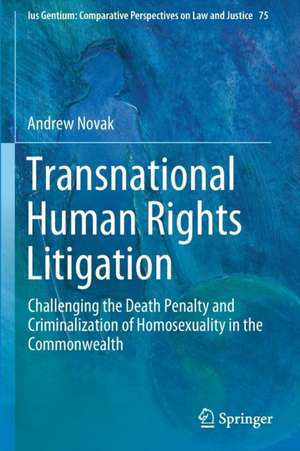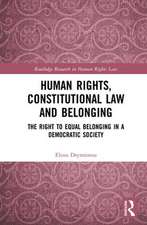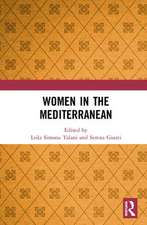Transnational Human Rights Litigation: Challenging the Death Penalty and Criminalization of Homosexuality in the Commonwealth: Ius Gentium: Comparative Perspectives on Law and Justice, cartea 75
Autor Andrew Novaken Limba Engleză Paperback – 14 oct 2020
The “sharing” of human rights jurisprudence among judges across legal systems is currently spreading emerging norms among domestic courts and contributing to the evolution of international law. While prior studies have focused on international and foreign citations in judicial decisions, this global migration of constitutional norms is driven not by judges but by legal advocates themselves, who cite and apply international and foreign law in their pleadings in pursuit of a specific human rights agenda. Local and transnational legal advocates form partnerships and networks that transmit legal strategy and comparativedoctrine, taking advantage of similarities in postcolonial legal and constitutional frameworks. Using examples such as the abolition of the death penalty and decriminalization of same-sex relations, this book traces the transnational networks of human rights lawyers and advocacy groups who engage in constitutional litigation before domestic and supranational tribunals in order to embed international human rights norms in local contexts. In turn, domestic human rights litigation influences the evolution of international law to reflect state practice in a mutually reinforcing process. Accordingly, international and foreign legal citations offer transnational human rights advocates powerful tools for legal reform.
| Toate formatele și edițiile | Preț | Express |
|---|---|---|
| Paperback (1) | 885.33 lei 6-8 săpt. | |
| Springer International Publishing – 14 oct 2020 | 885.33 lei 6-8 săpt. | |
| Hardback (1) | 891.33 lei 6-8 săpt. | |
| Springer International Publishing – 14 oct 2019 | 891.33 lei 6-8 săpt. |
Din seria Ius Gentium: Comparative Perspectives on Law and Justice
- 20%
 Preț: 1128.16 lei
Preț: 1128.16 lei - 20%
 Preț: 1565.18 lei
Preț: 1565.18 lei - 18%
 Preț: 1115.28 lei
Preț: 1115.28 lei - 18%
 Preț: 904.28 lei
Preț: 904.28 lei - 18%
 Preț: 1001.81 lei
Preț: 1001.81 lei -
 Preț: 180.18 lei
Preț: 180.18 lei - 24%
 Preț: 787.31 lei
Preț: 787.31 lei - 18%
 Preț: 1115.28 lei
Preț: 1115.28 lei - 15%
 Preț: 635.31 lei
Preț: 635.31 lei - 18%
 Preț: 1108.67 lei
Preț: 1108.67 lei - 18%
 Preț: 1007.97 lei
Preț: 1007.97 lei - 18%
 Preț: 784.79 lei
Preț: 784.79 lei - 18%
 Preț: 1223.11 lei
Preț: 1223.11 lei - 18%
 Preț: 891.02 lei
Preț: 891.02 lei - 18%
 Preț: 1009.40 lei
Preț: 1009.40 lei - 18%
 Preț: 1005.74 lei
Preț: 1005.74 lei - 18%
 Preț: 1014.89 lei
Preț: 1014.89 lei - 18%
 Preț: 896.70 lei
Preț: 896.70 lei - 15%
 Preț: 641.85 lei
Preț: 641.85 lei - 18%
 Preț: 779.71 lei
Preț: 779.71 lei - 18%
 Preț: 1010.79 lei
Preț: 1010.79 lei - 18%
 Preț: 1010.03 lei
Preț: 1010.03 lei - 18%
 Preț: 950.52 lei
Preț: 950.52 lei - 15%
 Preț: 638.76 lei
Preț: 638.76 lei - 18%
 Preț: 947.50 lei
Preț: 947.50 lei - 20%
 Preț: 564.78 lei
Preț: 564.78 lei - 18%
 Preț: 1115.14 lei
Preț: 1115.14 lei - 18%
 Preț: 939.42 lei
Preț: 939.42 lei - 15%
 Preț: 635.80 lei
Preț: 635.80 lei - 15%
 Preț: 637.59 lei
Preț: 637.59 lei - 15%
 Preț: 643.65 lei
Preț: 643.65 lei - 24%
 Preț: 809.18 lei
Preț: 809.18 lei
Preț: 885.33 lei
Preț vechi: 1079.66 lei
-18% Nou
Puncte Express: 1328
Preț estimativ în valută:
169.40€ • 177.51$ • 140.05£
169.40€ • 177.51$ • 140.05£
Carte tipărită la comandă
Livrare economică 12-26 aprilie
Preluare comenzi: 021 569.72.76
Specificații
ISBN-13: 9783030285487
ISBN-10: 3030285480
Pagini: 182
Ilustrații: XI, 182 p.
Dimensiuni: 155 x 235 mm
Greutate: 0.28 kg
Ediția:1st ed. 2020
Editura: Springer International Publishing
Colecția Springer
Seria Ius Gentium: Comparative Perspectives on Law and Justice
Locul publicării:Cham, Switzerland
ISBN-10: 3030285480
Pagini: 182
Ilustrații: XI, 182 p.
Dimensiuni: 155 x 235 mm
Greutate: 0.28 kg
Ediția:1st ed. 2020
Editura: Springer International Publishing
Colecția Springer
Seria Ius Gentium: Comparative Perspectives on Law and Justice
Locul publicării:Cham, Switzerland
Cuprins
Chapter 1. Introduction: Lawyers, Strategic Litigation, and the Transnational Judicial Dialogue.- Chapter 2. Applying the Lens of Transnational Advocacy Networks to Human Rights Litigation.- Chapter 3.Transnational Legal Citation as a Method of Norm Diffusion.- Chapter 4. Litigation and the Abolition of the Mandatory Death Penalty.- Chapter 5. BLitigation and the Decriminalization of Homosexuality.- Chapter 6: Conclusion: Transnational Litigation as part of a Comprehensive Human Rights Strategy.
Notă biografică
Andrew Novak is Assistant Professor in Criminology Law and Society at George Mason University, Virginia, USA. He has a PhD from Middlesex University School of Law, a JD from Boston University School of Law, and an MSc in African Politics from the School of Oriental and African Studies.
Textul de pe ultima copertă
This book analyzes the role of strategic human rights litigation in the dissemination and migration of transnational constitutional norms and provides a detailed analysis of how transnational human rights advocates and their local partners have used international and foreign law to promote abolition of the death penalty and decriminalization of homosexuality.
The “sharing” of human rights jurisprudence among judges across legal systems is currently spreading emerging norms among domestic courts and contributing to the evolution of international law. While prior studies have focused on international and foreign citations in judicial decisions, this global migration of constitutional norms is driven not by judges but by legal advocates themselves, who cite and apply international and foreign law in their pleadings in pursuit of a specific human rights agenda. Local and transnational legal advocates form partnerships and networks that transmit legal strategy and comparative doctrine, taking advantage of similarities in postcolonial legal and constitutional frameworks. Using examples such as the abolition of the death penalty and decriminalization of same-sex relations, this book traces the transnational networks of human rights lawyers and advocacy groups who engage in constitutional litigation before domestic and supranational tribunals in order to embed international human rights norms in local contexts. In turn, domestic human rights litigation influences the evolution of international law to reflect state practice in a mutually reinforcing process. Accordingly, international and foreign legal citations offer transnational human rights advocates powerful tools for legal reform.
The “sharing” of human rights jurisprudence among judges across legal systems is currently spreading emerging norms among domestic courts and contributing to the evolution of international law. While prior studies have focused on international and foreign citations in judicial decisions, this global migration of constitutional norms is driven not by judges but by legal advocates themselves, who cite and apply international and foreign law in their pleadings in pursuit of a specific human rights agenda. Local and transnational legal advocates form partnerships and networks that transmit legal strategy and comparative doctrine, taking advantage of similarities in postcolonial legal and constitutional frameworks. Using examples such as the abolition of the death penalty and decriminalization of same-sex relations, this book traces the transnational networks of human rights lawyers and advocacy groups who engage in constitutional litigation before domestic and supranational tribunals in order to embed international human rights norms in local contexts. In turn, domestic human rights litigation influences the evolution of international law to reflect state practice in a mutually reinforcing process. Accordingly, international and foreign legal citations offer transnational human rights advocates powerful tools for legal reform.
Caracteristici
Analyzes the role of strategic human rights litigation in the dissemination and migration of transnational constitutional norms Provides a detailed analysis of how transnational human rights advocates have used international and foreign law to promote abolition of the death penalty, restriction of life imprisonment, and decriminalization of homosexuality Confirms the mutually reinforcing relationship between domestic and international law, including the role of legal advocates as the instrumental drivers of this process






















